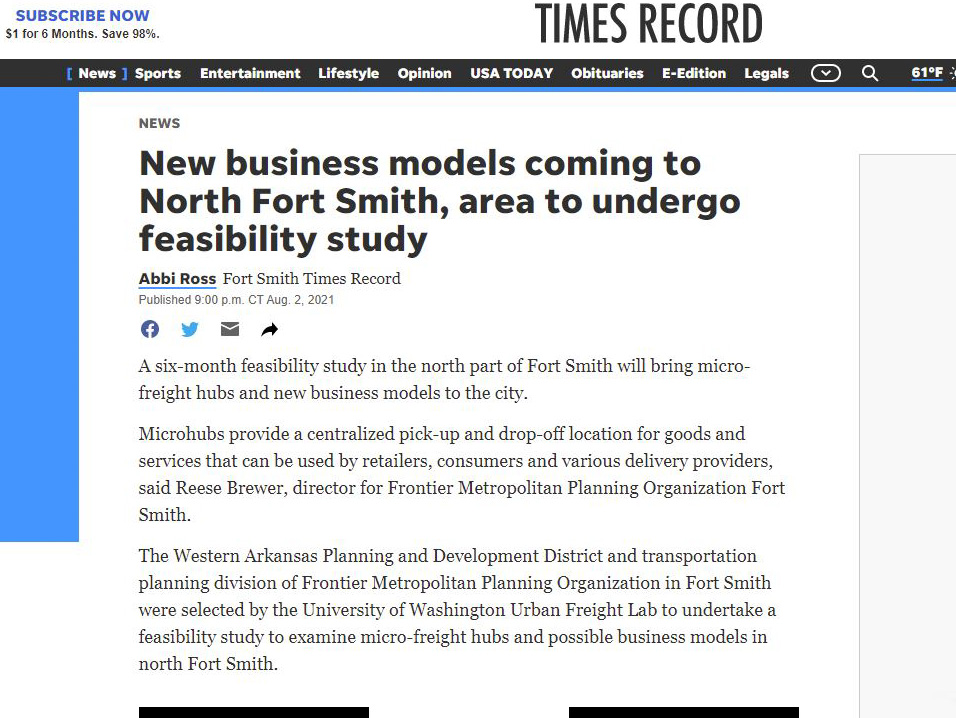
By Abbi Ross
A six-month feasibility study in the north part of Fort Smith will bring micro-freight hubs and new business models to the city.
Microhubs provide a centralized pick-up and drop-off location for goods and services that can be used by retailers, consumers and various delivery providers, said Reese Brewer, director for Frontier Metropolitan Planning Organization Fort Smith.
The Western Arkansas Planning and Development District and transportation planning division of Frontier Metropolitan Planning Organization in Fort Smith were selected by the University of Washington Urban Freight Lab to undertake a feasibility study to examine micro-freight hubs and possible business models in north Fort Smith.
Brewer was inspired to apply for the grant in order to address some of the inequalities faced by members of the community through change.
“As a member of the Transportation Research Board (National Academies of Science) Freight Transportation and Planning committee (AT015), I believed that historically marginalized neighborhoods are often seen as an ongoing challenge rather than for their potential transformation,” Brewer noted.
“We are seeking ways to increase equity to services, benefit historically marginalized communities and be joined to social service agencies and minority-owned businesses,” Brewer added.
The vision for the Generating Opportunity for All Micro-Freight Hub is a new way to conduct freight delivery and business within low-income and diverse neighborhoods in western Arkansas and in vulnerable communities across the nation, according to a release announcing the study.
The benefits of a micro-freight hub
Fort Smith City Administrator Carl Geffken shared some of his thoughts on the study and partnership in a statement released by WAPDD and FMPO announcing the grant.
“We are already beginning to see this business model in other cities,” Geffken said in the release. “Local delivery from strategically located micro-freight hubs are already demonstrating their economic viability and advantage.”
The GOAL micro-freight hub project would help low-income communities in a number of ways including by increasing access to shared micromobility services, establishing appropriate minority-owned businesses and social service agencies as freight service agents, and helping to create jobs within low-income neighborhoods.
They can also help reduce energy consumption, noise pollution, congestion and more by allowing the final mile of delivery to be shifted to low-emission vehicles or soft transportation modes, according to the University of Washington Supply Chain Transportation and Logistics Center.
What the study will examine
During the study there will be interviews with local agencies and businesses on project proposals and needs, focus groups to identify suitable incentives to social service agencies and minority businesses to operate micro-freight hubs, and policy and strategy creation for implementation and deployment.
Demographic and business data will also be gathered and analyzed, Brewer said.
“As a partner in this study, the City of Fort Smith hopes to reach the goal of creating jobs, coordinating with the regional freight industry and agencies in north Fort Smith,” the grant news release added.
Brewer plans on examining how micro-freight hubs can increase equity to services, benefit historically marginalized communities and be joined to social service agencies and minority-owned businesses through the study.
“Our goal during this effort with the University of Washington Urban Freight Lab is to create a cohesive strategy, to develop a sound planning process, to grow collaborative relationships, to produce a sustainable business model, and to ultimately implement a micro-freight hub pilot project that leverages local community resources,” Brewer said.